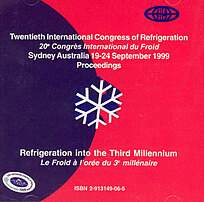
IIR document
Frontiers in refrigeration and cooling: how to obtain and sustain ultra low temperatures beyond nature's ambience.
Author(s) : KÖNIG R.
Summary
The investigation of matter at very low temperatures close to absolute zero is a powerful and important subject as it provides the unique possibility for studying physical properties, e.g. phase transitions, in an environment where most of the unavoidable disturbances present at higher temperatures are almost completely frozen out. In particular, the improvement of the standard cooling techniques for mK-and microK-temperatures, i.e. helium 3-helium 4 dilution refrigeration and nuclear adiabatic refrigeration, respectively, opens up a temperature range for the study of liquid and solid matter several orders of magnitude below the minimum temperature existing in nature (background temperature of the universe, about 2.7 K). In this paper, some important contributions obtained at the ultra low temperature facility at the University of Bayreuth is discussed: 1) the achievement of a minimum electronic temperature of T(el)=1.5 microK by nuclear adiabatic refrigeration of platinum, 2) the progress in improving the thermal coupling between different materials at low temperatures, and 3) recent developments in low temperature thermometry.
Available documents
Format PDF
Available
Public price
20 €
Member price*
Free
* Best rate depending on membership category (see the detailed benefits of individual and corporate memberships).
Details
- Original title: Frontiers in refrigeration and cooling: how to obtain and sustain ultra low temperatures beyond nature's ambience.
- Record ID : 2000-1162
- Languages: English
- Source: 20th International Congress of Refrigeration: Refrigeration into the Third Millennium.
- Publication date: 1999/09/19
Links
See other articles from the proceedings (447)
See the conference proceedings
Indexing
- Themes: Other applications of cryogenic temperatures
- Keywords: Design; Research; Absolute zero; Cryocooler; Cryogenics
-
A novel vibration suppression system for mechan...
- Author(s) : YANG B. Y., WU Y. N., TANG Y. J., et al.
- Date : 2008/04/05
- Languages : English
- Source: Cryogenics and refrigeration. Proceedings of ICCR'2008.
View record
-
Recent developments for ship propulsion using h...
- Author(s) : SOULEN R. J., FRANCAVILLA T. L., GUBSER D. U.
- Date : 1998/04/21
- Languages : English
- Source: Cryogenics and refrigeration. Proceedings of ICCR '98.
View record
-
High Temperature Superconducting Space Experime...
- Author(s) : KAWECKI T. G., CHAPPIE S. S., MAHONY D. R.
- Date : 1996/10
- Languages : English
- Source: 1995 Space Cryogenics Workshop.
View record
-
Herschel-Planck, and the next steps in space cr...
- Author(s) : COLLAUDIN B., LINDER M., RANDO N.
- Date : 2002/07/22
- Languages : English
- Source: Proceedings of the nineteenth International Cryogenic Engineering Conference. ICEC 19.
View record
-
Cryocooler performance estimator.
- Author(s) : KITTEL P.
- Date : 2006/06/14
- Languages : English
View record
